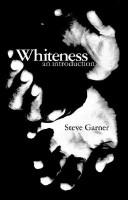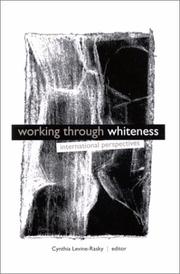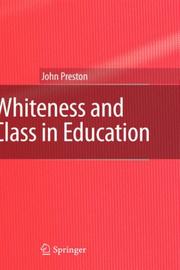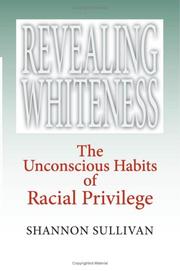| Listing 1 - 10 of 22 | << page >> |
Sort by
|
Book
ISBN: 9462098670 9462098697 9462098689 Year: 2015 Publisher: Rotterdam : SensePublishers : Imprint: SensePublishers,
Abstract | Keywords | Export | Availability | Bookmark
 Loading...
Loading...Choose an application
- Reference Manager
- EndNote
- RefWorks (Direct export to RefWorks)
Returning seven years later to their original pieces from this landmark book, over 20 leading scholars and activists revisit and reframe their rich contributions to a burgeoning scholarship on Whiteness. With new reflective writings for each chapter, and valuable sections on relevant readings and resources, this volume refreshes and enhances the first text to pay critical and sustained attention to Whiteness in education, with implications far beyond national borders. Contributors include George Sefa Dei, Tracey Lindberg, Carl James, Cynthia Levine-Rasky, and the late Patrick Solomon. Courageously examining diverse perspectives, contexts, and institutional practices, contributors to this volume dismantle the underpinnings of inequitable power relations, privilege, and marginalization. The book’s relevance extends to those in a range of settings, with abundant and poignant lessons for enhancing and understanding transformative social justice work in education. Revisiting The Great White North? offers terrific grist for examining the persistence of Whiteness even as it shape-shifts. Chapters are comprehensive, theoretically rich, and anchored in personal experience. Authors’ reflections on the seven years since publication of the first edition of this book complexify how we understand Whiteness, while simultaneously driving home the need not only to grapple with it, but to work against it. Christine Sleeter, Professor Emerita, California State University Monterey Bay Our understanding of racial inequities in education will be impoverished unless we look deeply at White privilege, its variation in different contexts, and resistances to change. Such is the call in this important book by Lund, Carr, and colleagues, whose analyses within Canadian contexts, framed and re-framed for this captivating revised edition, will be useful to educators and scholars around the world. Read this book today. Kevin Kumashiro, Dean, School of Education, University of San Francisco; President, National Association for Multicultural Education Darren Lund and Paul Carr have given the contributors to their original 2007 text the opportunity to revisit, rethink, reconceptualize, and reframe their earlier work. The result is an interesting, invigorating, and unsettling group of chapters that challenge readers to also revisit and rethink their own ideas about Whiteness, privilege, and power …. Teachers, administrators, policymakers, and researchers will all benefit from this critical work. Sonia Nieto, Professor Emerita, Language, Literacy, and Culture College of Education, University of Massachusetts, Amherst Lund and Carr bring together a superb collection of authors who collectively challenge readers to go beyond liberal platitudes about race … until educators confront the political, social and economic consequences of inequitably distributed privilege, the path towards equality and freedom will remain elusive. By immersing us in the discourse of Whiteness, the essays in this book illuminate that very path. Joel Westheimer, University Research Chair & Professor, Faculty of Education, University of Ottawa.
Education. --- Education --- Social Sciences --- Education - General --- Whites --- History. --- Race identity --- White people --- White persons --- Education, general. --- Ethnology --- Caucasian race --- Children --- Education, Primitive --- Education of children --- Human resource development --- Instruction --- Pedagogy --- Schooling --- Students --- Youth --- Civilization --- Learning and scholarship --- Mental discipline --- Schools --- Teaching --- Training --- Race identity. --- Race identity of whites --- Racial identity of whites --- Whiteness (Race identity) --- Race awareness --- Ethnic identity
Book
ISBN: 1137450126 1137450118 Year: 2016 Publisher: London : Palgrave Macmillan UK : Imprint: Palgrave Macmillan,
Abstract | Keywords | Export | Availability | Bookmark
 Loading...
Loading...Choose an application
- Reference Manager
- EndNote
- RefWorks (Direct export to RefWorks)
This is the first academic monograph to focus exclusively on issues of race, ethnicity, whiteness and multiculture at the English seaside. The book calls for acknowledgement of the racialised nature of this environment, and proposes that its distinctive spaces, places, traditions and narratives should be included within broader analyses of race in contemporary Britain. Introducing the concept of ‘coastal liquidity’ to explain shifting ethno-racial demographics, migratory politics and spatial dynamics at the edge of the sea, along with the relative im/mobilities of the minority ethnic communities who move and reside there, the author provides a relational exploration of seaside experiences: both as a locus of racialised categorisation, exclusion and subjugation, and one of resistance, conviviality and intercultural exchange. Combining theoretical insight and empirical fieldwork, the book disrupts dominant thinking that fixes ontologically minority ethnic bodies to urban spaces, and overcomes their erasure and silencing from the seaside landscapes of the popular imagination.
Race. --- Ethnicity. --- Whites --- Race identity. --- Race identity of whites --- Racial identity of whites --- Whiteness (Race identity) --- Ethnic identity --- Group identity --- Cultural fusion --- Multiculturalism --- Cultural pluralism --- Race awareness --- Physical anthropology --- Area studies. --- Demography. --- Ethnology-Europe. --- Ethnicity Studies. --- Area Studies. --- British Culture. --- Historical demography --- Social sciences --- Population --- Vital statistics --- Area research --- Foreign area studies --- Education --- Research --- Geography --- Study and teaching --- Ethnology—Europe. --- Ethnology

ISBN: 0415403634 0415403642 020394559X 9780415403634 9780415403641 9780203945599 1134140606 1280954809 9786610954803 9781134140602 9781134140558 9781134140596 Year: 2007 Publisher: London
Abstract | Keywords | Export | Availability | Bookmark
 Loading...
Loading...Choose an application
- Reference Manager
- EndNote
- RefWorks (Direct export to RefWorks)
What is whiteness? Why is it worth using as a tool in the social sciences? Making sociological sense of the idea of whiteness, this book skilfully argues how this concept can help us understand contemporary societies. If one of sociology's objectives is to make the familiar unfamiliar in order to gain heightened understanding, then whiteness offers a perfect opportunity to do so.Leaning firstly on the North American corpus, this key book critically engages with writings on the formation of white identities in Britain, Ireland and the Americas, using multidisciplinary sources.
Race discrimination. --- Racism. --- Whites --- Race identity. --- Bias, Racial --- Discrimination, Racial --- Race bias --- Racial bias --- Racial discrimination --- Discrimination --- Race prejudice --- Prejudices --- Anti-racism --- Race relations --- Race identity of whites --- Racial identity of whites --- Whiteness (Race identity) --- Race awareness --- Ethnic identity --- Critical race theory --- Race identity of white people --- Racial identity of white people --- White people --- White persons --- Ethnology --- Caucasian race

ISBN: 0791488721 0585475172 9780585475172 0791453405 9780791453407 0791453391 9780791453391 9780791488720 Year: 2002 Publisher: Albany : State University of New York Press,
Abstract | Keywords | Export | Availability | Bookmark
 Loading...
Loading...Choose an application
- Reference Manager
- EndNote
- RefWorks (Direct export to RefWorks)
What is whiteness? What is gained by claiming it as a critical perspective in anti-racism work? How do whiteness studies both redeem and assert the white subject? Working through Whiteness explores these questions through essays by Canadian, American, British, and Australian scholars, reflecting the broad array of academic inquiry into whiteness in the areas of law, ethics, education, feminism, politics, psychology, sociology, criminology, and social geography. Rarely has knowledge of whiteness as the practice of social domination been drawn from this far and wide. By embracing the leading edge in critical theory, this book is a crucial addition to the growing literature on whiteness.
Women, White --- Whites --- White women --- White people --- White persons --- Ethnology --- Caucasian race --- Race identity of whites --- Racial identity of whites --- Whiteness (Race identity) --- Race awareness --- Attitudes. --- Race identity. --- Psychology. --- Ethnic identity --- Race identity of white people --- Racial identity of white people
Book
ISBN: 0739192973 9780739192979 9780739192962 0739192965 Year: 2015 Publisher: Lanham
Abstract | Keywords | Export | Availability | Bookmark
 Loading...
Loading...Choose an application
- Reference Manager
- EndNote
- RefWorks (Direct export to RefWorks)
Composed after the election of the first black U.S. president, after the post-global financial crisis, more than a decade after 9/11, and concomitant with a rash of xenophobic incidents across the globe, Unveiling Whiteness distills key themes associated with a post-millennial global whiteness.
Whites --- Women, White --- Racism. --- White people --- White persons --- Ethnology --- Caucasian race --- Race identity of whites --- Racial identity of whites --- Whiteness (Race identity) --- Race awareness --- Bias, Racial --- Race bias --- Race prejudice --- Racial bias --- Prejudices --- Anti-racism --- Critical race theory --- Race relations --- White women --- Race identity. --- Attitudes. --- Ethnic identity --- Race identity of white people --- Racial identity of white people

ISBN: 1280969814 9786610969814 1402061080 1402061072 9048123070 Year: 2007 Publisher: Dordrecht : Springer,
Abstract | Keywords | Export | Availability | Bookmark
 Loading...
Loading...Choose an application
- Reference Manager
- EndNote
- RefWorks (Direct export to RefWorks)
The critical study of whiteness has influenced anti-racist pedagogy and research. A volatile area of study, in terms of the re-centering of white discourses and the appropriation of the writings of black scholars, confronting whiteness has become a controversial but potentially radical way of approaching educational issues. In this pioneering volume critical whiteness studies is applied in the United Kingdom in a variety of educational contexts. Although whiteness is considered to be a system of oppression that benefits white students and teachers in educational arenas it is not necessarily monolithic. Whiteness is flexible and inflected by class to produce new ‘whiteness(es)’ that are no less racist in intent or practice. Through the use of ethnographic, biographical and documentary research how whiteness ‘works’ in education is revealed. The ways in which working class whites are represented as ‘white trash’ or ‘chav’; the subtle actions of white middle class learners to reduce diversity in adult education and the pre-modern qualities of white ruling class schooling are used to highlight both divergence and congruence in the racial formation of whiteness. Policy issues are also considered, in particular the merits of regulating ‘hate speech’ in universities and the ways in which racist ‘civil defence pedagogies’ have become embedded in educational and homeland security policies. However, this book does not just consider the practices of whiteness but also how practitioners might consider critical whiteness studies in anti-racist practice. It is concerned with not only identifying how ‘white supremacy’ continues to dominate educational discourse and practice but how it can be resisted.
Educational sociology --- Education --- Multicultural education. --- Whites --- Social classes --- Social aspects --- Race identity. --- Race identity of whites --- Racial identity of whites --- Whiteness (Race identity) --- Race awareness --- Intercultural education --- Culturally relevant pedagogy --- Ethnic identity --- Education, Higher. --- Sociology of Education. --- Higher Education. --- College students --- Higher education --- Postsecondary education --- Universities and colleges --- Educational sociology. --- Higher education. --- Education and sociology --- Social problems in education --- Society and education --- Sociology, Educational --- Sociology --- Aims and objectives

ISBN: 9786612072932 1282072935 0253112133 9780253112132 9780253347381 0253347386 9780253218483 0253218489 6612072938 9781282072930 Year: 2006 Publisher: Bloomington
Abstract | Keywords | Export | Availability | Bookmark
 Loading...
Loading...Choose an application
- Reference Manager
- EndNote
- RefWorks (Direct export to RefWorks)
""[A] lucid discussion of race that does not sell out the black experience."" -- Tommy Lott, author of The Invention of RaceRevealing Whiteness explores how white privilege operates as an unseen, invisible, and unquestioned norm in society today. In this personal and selfsearching book, Shannon Sullivan interrogates her own whiteness and how being white has affected her. By looking closely at the subtleties of white domination, she issues a call for other white people to own up to their unspoken
Habit --- Race discrimination. --- Racism. --- Whites --- Psychology --- Bias, Racial --- Discrimination, Racial --- Race bias --- Racial bias --- Racial discrimination --- Discrimination --- Race prejudice --- Prejudices --- Anti-racism --- Critical race theory --- Race relations --- Race identity of whites --- Racial identity of whites --- Whiteness (Race identity) --- Race awareness --- Social aspects. --- Race identity. --- Ethnic identity --- United States --- Ethnic relations. --- Race relations. --- Race question --- Race identity of white people --- Racial identity of white people --- White people --- White persons --- Ethnology --- Caucasian race
Book
ISBN: 1441621377 9781441621375 1438427689 9781438427539 1438427530 9781438427683 Year: 2009 Publisher: New York : State University of New York Press,
Abstract | Keywords | Export | Availability | Bookmark
 Loading...
Loading...Choose an application
- Reference Manager
- EndNote
- RefWorks (Direct export to RefWorks)
Top Three Finalist for the 2010 John Hope Franklin Publication Prize presented by the American Studies AssociationTheories of intersectionality have fundamentally transformed how feminists and critical race scholars understand the relationship between race and gender, but are often limited in their focus on contemporary experiences of interlocking oppressions. In The Specter of Sex, Sally L. Kitch explores the "backstory" of intersectionality theory—the historical formation of the racial and gendered hierarchies that continue to structure U.S. culture today. Kitch uses a genealogical approach to explore how a world already divided by gender ideology became one simultaneously obsessed with judgmental ideas about race, starting in Europe and the English colonies in the late seventeenth century. Through an examination of religious, political, and scientific narratives, public policies and testimonies, laws, court cases, and newspaper accounts, The Specter of Sex provides a rare comparative study of the racial formation of five groups—American Indians, African Americans, Latinos, Asian Americans, and European whites—and reveals gendered patterns that have served white racial dominance and repeated themselves with variations over a two-hundred-year period.
Sex role --- Gender identity --- Blacks --- Whites --- Gender Studies & Sexuality --- Gender & Ethnic Studies --- Social Sciences --- Race identity of whites --- Racial identity of whites --- Whiteness (Race identity) --- Race awareness --- Black identity --- Blackness (Race identity) --- Negritude --- Race identity of blacks --- Racial identity of blacks --- Ethnicity --- Sex identity (Gender identity) --- Sexual identity (Gender identity) --- Identity (Psychology) --- Sex (Psychology) --- Queer theory --- History. --- Race identity. --- History --- Race identity --- Ethnic identity --- Race identity of Black people --- Racial identity of Black people --- Black persons --- Negroes --- Ethnology --- Black people --- Gender dysphoria

ISBN: 0742568733 0742514803 9780742568730 9780742514805 0742514811 9780742514812 9780742514805 Year: 2005 Publisher: Lanham, Maryland ; Oxford, England : Rowman & Littlefield Publishers, Inc.,
Abstract | Keywords | Export | Availability | Bookmark
 Loading...
Loading...Choose an application
- Reference Manager
- EndNote
- RefWorks (Direct export to RefWorks)
White on White/Black on Black is a unique contribution to the philosophy of race. The text explores how 14 philosophers, 7 white and 7 black, philosophically understand the dynamics of the process of racialization.
Race awareness. --- Blacks --- Whites --- Race --- Physical anthropology --- Race identity of whites --- Racial identity of whites --- Whiteness (Race identity) --- Race awareness --- Black identity --- Blackness (Race identity) --- Negritude --- Race identity of blacks --- Racial identity of blacks --- Ethnicity --- Awareness --- Ethnopsychology --- Ethnic attitudes --- Race identity. --- Philosophy. --- Ethnic identity --- Race identity --- Philosophy --- Race identity of white people --- Racial identity of white people --- White people --- Race identity of Black people --- Racial identity of Black people --- White persons --- Ethnology --- Caucasian race --- Black persons --- Negroes --- Black people
Book
ISBN: 1443867993 1322179921 9781322179926 9781443867993 Year: 2013 Publisher: Newcastle upon Tyne : Cambridge Scholars Publishing,
Abstract | Keywords | Export | Availability | Bookmark
 Loading...
Loading...Choose an application
- Reference Manager
- EndNote
- RefWorks (Direct export to RefWorks)
Even in those areas of academia which one would consider to be most resistant to white domination (such as critical race theory and multicultural education), both covert and overt racial oppression are apparent. What is the role of white academics in these fields in creating racial oppression? Is there any escape from white supremacy and do white academics have any role in resisting it or are they always complicit? In this book, fictional tropes are used to consider the role of whiteness in ...
Educational sociology. --- Multicultural education. --- Whites --- Social change. --- Change, Social --- Cultural change --- Cultural transformation --- Societal change --- Socio-cultural change --- Social history --- Social evolution --- Race identity of whites --- Racial identity of whites --- Whiteness (Race identity) --- Race awareness --- Intercultural education --- Education --- Culturally relevant pedagogy --- Education and sociology --- Social problems in education --- Society and education --- Sociology, Educational --- Sociology --- Race identity. --- Ethnic identity --- Aims and objectives --- Culturally sustaining pedagogy --- Race identity of white people --- Racial identity of white people --- White people --- White persons --- Ethnology --- Caucasian race
| Listing 1 - 10 of 22 | << page >> |
Sort by
|

 Search
Search Feedback
Feedback About UniCat
About UniCat  Help
Help News
News